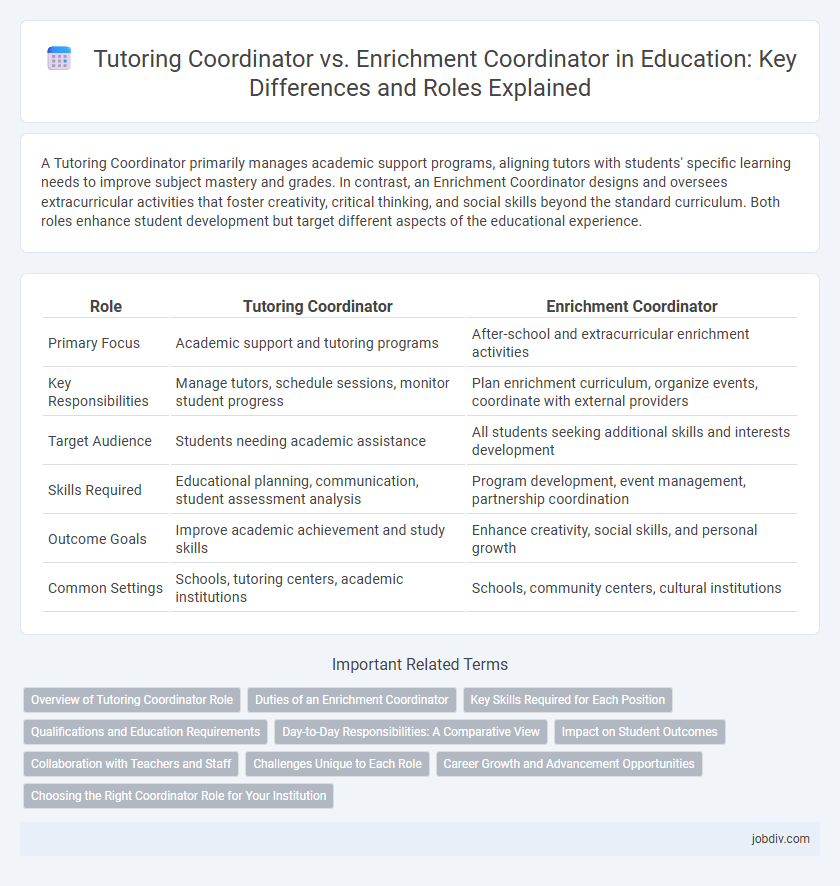A Tutoring Coordinator primarily manages academic support programs, aligning tutors with students' specific learning needs to improve subject mastery and grades. In contrast, an Enrichment Coordinator designs and oversees extracurricular activities that foster creativity, critical thinking, and social skills beyond the standard curriculum. Both roles enhance student development but target different aspects of the educational experience.
Table of Comparison
| Role | Tutoring Coordinator | Enrichment Coordinator |
|---|---|---|
| Primary Focus | Academic support and tutoring programs | After-school and extracurricular enrichment activities |
| Key Responsibilities | Manage tutors, schedule sessions, monitor student progress | Plan enrichment curriculum, organize events, coordinate with external providers |
| Target Audience | Students needing academic assistance | All students seeking additional skills and interests development |
| Skills Required | Educational planning, communication, student assessment analysis | Program development, event management, partnership coordination |
| Outcome Goals | Improve academic achievement and study skills | Enhance creativity, social skills, and personal growth |
| Common Settings | Schools, tutoring centers, academic institutions | Schools, community centers, cultural institutions |
Overview of Tutoring Coordinator Role
A Tutoring Coordinator manages the organization and delivery of academic support services, ensuring students receive personalized instruction to improve performance across subjects like math, science, and language arts. They collaborate with tutors, teachers, and parents to develop effective tutoring schedules, monitor student progress, and adjust strategies to meet individual learning needs. Data-driven assessment and tailored intervention plans are key responsibilities, enhancing student achievement and supporting educational goals.
Duties of an Enrichment Coordinator
An Enrichment Coordinator designs and implements specialized programs that enhance students' learning experiences beyond the standard curriculum. They collaborate with educators to integrate arts, STEM, and extracurricular activities, ensuring a diverse and stimulating educational environment. By assessing student interests and needs, they tailor enrichment opportunities that promote creativity, critical thinking, and personal growth.
Key Skills Required for Each Position
A Tutoring Coordinator requires strong organizational skills, in-depth knowledge of curriculum standards, and the ability to manage tutor schedules while providing academic support tailored to student needs. An Enrichment Coordinator demands creativity in designing engaging programs, excellent communication skills for collaborating with educators and families, and expertise in developing extracurricular activities that enhance student learning experiences. Both roles necessitate leadership and problem-solving abilities but prioritize different skill sets aligned with academic tutoring versus holistic enrichment.
Qualifications and Education Requirements
A Tutoring Coordinator typically requires a bachelor's degree in education or a related field, alongside experience in academic support and instructional strategies. In contrast, an Enrichment Coordinator often holds credentials in curriculum development, educational leadership, or specialized subject areas, emphasizing program design and creative learning enhancement. Both roles benefit from strong organizational skills, but the Tutoring Coordinator leans more towards direct student intervention, while the Enrichment Coordinator focuses on broad-based program planning and enrichment activities.
Day-to-Day Responsibilities: A Comparative View
Tutoring Coordinators manage the scheduling, matching, and progress tracking of students and tutors, ensuring personalized academic support. Enrichment Coordinators design and implement extracurricular programs aimed at developing skills beyond core academics, such as arts, leadership, and STEM activities. Both roles require coordination with educators and stakeholders, but Tutoring Coordinators focus on remedial or supplemental instruction while Enrichment Coordinators emphasize holistic student development.
Impact on Student Outcomes
Tutoring Coordinators directly influence student outcomes by organizing personalized support that targets individual learning gaps, resulting in improved academic performance and confidence. Enrichment Coordinators enhance student outcomes by designing engaging programs that foster critical thinking, creativity, and social skills, promoting holistic development beyond core curricula. Both roles contribute uniquely to student success, with tutoring focusing on remediation and enrichment emphasizing intellectual and emotional growth.
Collaboration with Teachers and Staff
A Tutoring Coordinator collaborates closely with teachers to identify student learning gaps and tailor tutoring programs that align with curriculum goals, ensuring targeted academic support. An Enrichment Coordinator works alongside staff to design and implement extracurricular activities that complement classroom instruction and foster holistic student development. Both roles require strong communication and teamwork skills to effectively integrate their initiatives within the school's educational framework.
Challenges Unique to Each Role
Tutoring Coordinators face challenges in customizing instructional strategies to meet diverse student needs while managing schedules and coordinating with multiple tutors. Enrichment Coordinators encounter difficulties in designing engaging, interdisciplinary programs that foster creativity and critical thinking beyond the core curriculum. Both roles require effective communication and adaptability, but their primary focus shifts between remediation and enhancement of student learning experiences.
Career Growth and Advancement Opportunities
Tutoring Coordinators often gain specialized skills in academic support and personalized learning strategies, positioning them for roles such as Academic Program Managers or Curriculum Specialists. Enrichment Coordinators acquire expertise in extracurricular program development and student engagement, paving the way to careers in Student Activities Director or Educational Leadership. Career growth in both paths benefits from leadership experience, strategic planning capabilities, and a strong understanding of educational frameworks.
Choosing the Right Coordinator Role for Your Institution
Selecting the right coordinator role hinges on your institution's goals: a Tutoring Coordinator focuses on managing academic support services and personalized learning plans to boost student performance, while an Enrichment Coordinator designs programs that foster creativity, critical thinking, and extracurricular engagement. Institutions prioritizing standardized test improvement and academic remediation benefit from a Tutoring Coordinator's targeted interventions, whereas those aiming to enhance holistic student development and experiential learning thrive with an Enrichment Coordinator. Evaluating student needs and institutional objectives ensures alignment with the coordinator role that maximizes educational outcomes and resource allocation.
Tutoring Coordinator vs Enrichment Coordinator Infographic

 jobdiv.com
jobdiv.com